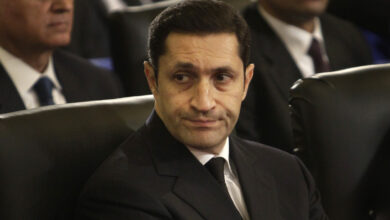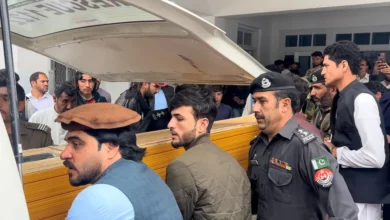Following several days’ worth of headlines devoted to last week’s tragic sectarian clashes and the subsequent fallout, Thursday’s papers arrive with news of a ‘unified law’ created to ensure the security of “all places of worship,” as announced on the front page of Al-Ahram.
The state-owned paper leads with a report that promises the enforcement of the aforementioned law within 30 days.
Created by the National Justice committee – a government body assembled on Wednesday, in accordance with a request from Prime Minister Essam Sharaf – the law will “prohibit any form of discrimination between Egyptians,” while also laying down guidelines for the construction of any place of worship, in particular any church or mosque, from this point onwards.
As announced during Wednesday’s press conference, the National Justice committee exists primarily as “a buffer against any and all attempts at inciting sectarian conflicts.” The committee will also be responsible for “charting a map of all the problems and causes relevant to this particular issue, as well as suggesting quick and efficient methods to resolve them.”
During the press conference, members of the newly formed committee also stressed the importance of “refraining from the staging of any gatherings or protests in close proximity to mosques and churches,” and warned against the “use of religious slogans in elections, or party affairs.”
The National Justice committee also announced that, according to its findings, the recent eruption of sectarian violence in Imbaba was the result of a “highly organized, and illegal, attempt at instigating chaos.”
Furthermore, the committee declared that all churches currently closed would soon reopen, pending individual case studies regarding their security status.
Contradicting the National Justice committee’s findings is a statement by Grand Mufti Ali Gomaa, which appears on the front page of independent daily Al-Shorouk. “The sectarian violence witnessed in Imbaba is not the result of some foreign plan; it is an internal issue, and the logical outcome of several unresolved issues,” Gomaa stated on Wednesday evening, during his monthly media conference.
Meanwhile, Al-Shorouk also points out that a fact-finding committee formed by the National Human Rights Council has announced that the “responsibility of the sectarian violence in Imbaba lies firmly with the security services.”
Grand Mufti Ali Gomaa also makes an appearance on the front page of independent daily Al-Dostour, where he predicts that should a civil war break out in Egypt, “it will last 20 years.” Gomaa also claimed that said civil war would “pull the country 60 years back.”
He stressed the importance of national unity, claiming that “while sectarian conflicts are an internal issue, foreign forces will be quick to manipulate and benefit from it.” Gomaa claimed that he was severely distressed by “Facebook and Israeli news reports” of last week’s violence in Imbaba.
Al-Ahram follows up its report on the measures against sectarian violence with an update on Habib al-Adly, stating that the former interior minister will go on trial next week, facing charges of illicit gains. Should he be found guilty, and claims that he possesses over 1LE billion’s worth of real estate are proven true, Adly would be sentenced to a minimum of 15 years in prison.
Last week, Adly was sentenced to 12 years in prison for charges of money laundering and profiteering. Al-Ahram points out that these charges pale in comparison to the sentence to be carried out if Adly is found guilty of killing protesters during the revolution, a charge which he currently stands trial.
For its lead story, Al-Akhbar reports on a bill proposing a law by which to govern the upcoming parliamentary and presidential elections. The bill, to be announced this Saturday, has been put forward by a “highly esteemed legal and judiciary committee,” as well as an equally “highly esteemed committee of members of the supreme armed forces,” according to the state-owned paper.
The law aims for the creation of an “appropriate environment and state of affairs that will attract as many voters as possible” while simultaneously achieving the “largest possible amount of democracy.”
A delegation from the Swiss government has announced that a total amount of LE2.8 billion has been frozen in various Swiss banks, and will be returned to Egypt in full upon the completion of a few legal matters.
According to a report in state-run Al-Gomhurriya, the amount was taken from the bank accounts of 14 individuals, which the paper lists as former President Hosni Mubarak, his wife Suzanne, their two sons Alaa and Gamal Mubarak and their wives; former Interior Minister Adly, his wife Elham Sharshar, and their son Sherif; the former first lady’s brother Mounir Thabet; steel tycoon Ahmed Ezz; and former ministers Zoheir Garana, Ahmed al-Maghrabi and Rachid Mohamed Rachid.
Egypt's papers:
Al-Ahram: Daily, state-run, largest distribution in Egypt
Al-Akhbar: Daily, state-run, second to Al-Ahram in institutional size
Al-Gomhurriya: Daily, state-run
Rose al-Youssef: Daily, state-run
Al-Dostour: Daily, privately owned
Al-Shorouk: Daily, privately owned
Al-Wafd: Daily, published by the liberal Wafd Party
Al-Arabi: Weekly, published by the Arab Nasserist party
Youm7: Weekly, privately owned
Sawt al-Umma: Weekly, privately owned




